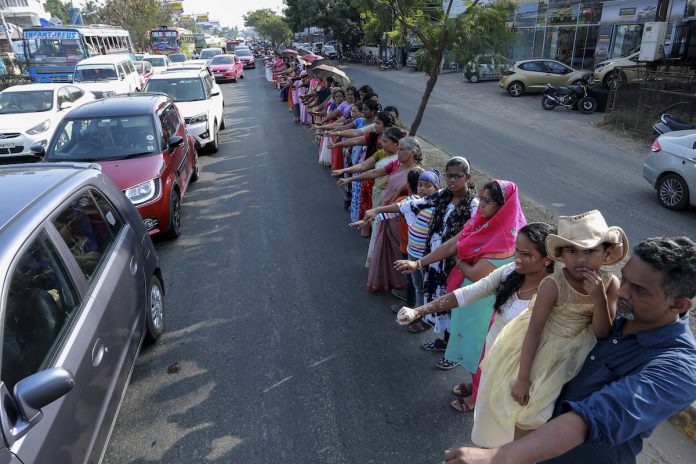To protest the controversial Citizenship Amendment Act (CAA) and mark the India’s 71st Republic Day, churches and mosques in the southern state of Kerala hoisted the national flag and read out the preamble to the Constitution, while a 7 million-strong human chain was formed across the state.
Churches under the Kerala Regional Latin Catholic Council (KRLCC) and mosques under the Kerala State Wakf Board organized the collective action.
On Jan. 17, the Wakf Board instructed mosques and other institutions under its auspices to unfurl the national flag and pledge to protect the constitution on Jan. 26 — Republic Day.
The Latin-rite bishops of Kerala, along with other bishops and archbishops across India, likewise urged Christians to mark the 71st Republic Day by reading the preamble to the Constitution.
The aim of the act is to remind every citizen of India’s secular roots and underscore that all Indians stand together as one nation.
A statement condemning discrimination was also read out in 12 dioceses across Kerala, while congregants were asked to take an oath to protect the Constitution, said KRLCC spokesperson Sherry Thomas.
Chain of solidarity
More than 7 million people in Kerala also formed a massive human chain spanning 620 kilometers on Republic Day to protest the CAA and NPR. Participants recited the preamble to the Constitution and pledged to protect it from communal, divisive, and fascist forces.
Kerala Chief Minister Pinarayi Vijayan also joined the chain in Thiruvananthapuram, Kerala’s state capital.
The ecumenical effort between Muslims and Christians was intended to protest against the CAA and planned National Population Register (NPR) initiated by the Hindu-nationalist government of Prime Minister Narendra Modi.
The CAA provides a path to citizenship for Buddhist, Christian Hindu, Jain, Parsi, and Sikh practitioners, but not Muslims, fleeing persecution from Pakistan, Bangladesh, and Afghanistan.
Critics argue the law is discriminatory.
The NPR, a comprehensive identity database of everyone living in India, would require every person in the country to prove their citizenship.
Shaju Vincent, a Christian IT expert, told LiCAS.news the Republic Day protest against the CAA and NPR were “done in a spirit of collective action.”
“We are saying that we will lose our citizenship on account of divisive citizenship laws and policies being undertaken by a Hindu nationalist government,” Vincent said.
Vincent said that Christians fear the Hindu hardliners targeting Muslims will next set their sites on Christians.
Meanwhile, Azmathulla Khan, a young Muslim, told LiCAS.news that people, especially religious minorities, were afraid of the CAA and NPR.
“I appreciate that mosques and churches have taken the collective step to show their opposition to the CAA and express their allegiance to the constitution by taking an oath to protect it at all costs,” Khan said.
Khan also expressed concerns over how the NPR would place the onus of proving one’s citizenship on the people themselves.
“Where will [older] people get the documents to prove their citizenship,” Kahan asked.
Christian leaders speak out
Bishop Paul Antony Mullassery of Kollam diocese in Kerala said that the Republic Day acts of protest were intended to make people conscious of their duties and obligations as citizens.
“The country is going through an unprecedented social situation. The prime minister, who took power by kissing the Constitution, is leading attempts to violate the values provided by the Constitution for this country,” Bishop Mullassery said.
“The most pressing thing about this violation is that it creates social divisions based on religion. We should react strongly to any efforts to exclude one particular community from the CAA,” he said.
He further expressed concerns that the government is attempting to marginalize Christians, citing, among other things, the decision to exclude Dalit (formerly untouchable) Christians from the constitutionally guaranteed “reservation rights” allowing them access to government jobs and places in educational institutions, which can enable them to have a better standard of living. About 16.6 percent of India’s total population are Dalits, while Dalits constitute 75 percent of India’s Christian population.
Unlike Hindu, Sikh and Buddhist Dalits, Muslims Dalits are also denied those reservation rights.
Meanwhile, Cardinal Baselios Cleemis of the Syro-Malankara Catholic Church and former president of the Catholic Bishops’ Conference of India, said that “religion cannot be a criterion for deciding one’s citizenship.”
In Syro-Malankara churches, parishes and Catholic organizations likewise read the preamble to the Constitution and pledged to protect the Constitution on Republic Day.
Joseph Powathil, the senior-most Archbishop of the Syro Malabar Church, Kerala, said that introducing the CAA was “like spurning the continuation of democracy in India.”
Christian opposition to the CAA have extended to other parts of India.
Archbishop Thomas D’Souza from Kolkata in West Bengal State, urged people to form a human chain in the city to protest discrimination.
That action was organized by the United Interfaith Foundation, with the aim of Indians upholding “the values of justice, liberty, equality, and fraternity guaranteed by the Constitution of India.”









